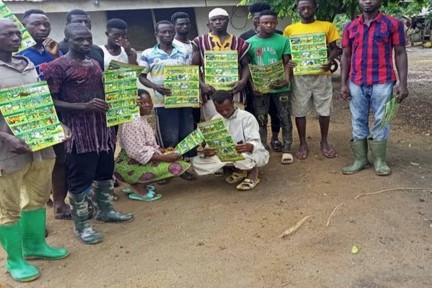Why Ghanaian Cocoa Farmers turn towards Sustainable Agriculture Practices
Ghana, one of the biggest producers of cocoa worldwide, is confronted with growing environmental and social issues because of traditional cocoa cultivation methods. However, cocoa growers in Ghana are beginning to understand the importance of shifting to sustainable farming methods. This article investigates the factors influencing Ghanaian cocoa farmers’ willingness to embrace sustainable farming methods and emphasizes the value of cooperation and knowledge sharing in this endeavor.
1. Economic Incentives:
Economic factors heavily influence farmers’ decisions to adopt sustainable agriculture practices. Numerous sustainability initiatives allow cocoa farmers to boost their income and access premium markets by delivering financial incentives (Schoneveld et al., 2020). For instance, premium prices are offered for ethically produced cocoa through certification programs like Rainforest Alliance and Fairtrade, encouraging growers to follow sustainability guidelines.

2. Environmental Awareness:
The awareness of environmental issues is a significant driving force behind adopting sustainable agriculture practices among cocoa farmers in Ghana. The detrimental effects of deforestation, soil degradation, and climate change are becoming increasingly evident. Farmers recognize that embracing sustainable farming methods can help mitigate these challenges, promote biodiversity, protect water resources, and ensure the long-term viability of their farms (Asare et al., 2019).
3. Knowledge and Training:
In order to motivate cocoa producers to adopt sustainable practices, access to information and training is essential. Training courses on sustainable farming practices are offered by a number of initiatives and organizations. According to Boafo et al. (2020), these programs emphasize good environmental practices, integrated pest management, social issues, and good agricultural practices. These programs give farmers the abilities and knowledge they need to successfully apply sustainable practices.
4. Social Impact:
Ghanaian cocoa growers are becoming more aware of the social benefits of sustainable agricultural practices. They are aware of the significance of encouraging ethical workplace behavior, safeguarding workers’ welfare, and developing strong community ties. Farmers may enhance working conditions, contribute to the social advancement of their communities, and create a more inclusive and equitable cocoa sector by adopting sustainability (Asare et al., 2019).
5. Collaboration and Partnerships:
Collaboration and partnerships between cocoa farmers, governmental organizations, non-profit organizations, and the private sector are critical for the implementation of sustainable agriculture practices. Initiatives like the Ghana Cocoa Forest REDD+ Program and CocoaAction encourage alliance by offering assistance, resources, and technical support to accelerate the adoption of sustainable agricultural methods (Schoneveld et al., 2020). Farms can achieve sustainability standards and access foreign markets by partnering with certification programs.
Conclusion:
The implementation of sustainable agricultural practices by Ghanaian cocoa producers is growing in popularity thanks to increased environmental awareness, financial incentives, knowledge sharing, and awareness of social implications. In order to help farmers migrate to sustainable methods, collaboration and partnerships across stakeholders are essential. Ghanaian cocoa farmers can help to preserve ecosystems, enhance their standard of living, and ensure the long-term viability of the cocoa sector by adopting sustainability.










































































